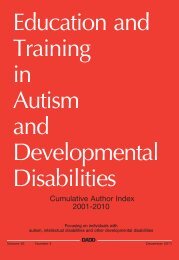Download the Journal (PDF) - Division on Autism and ...
Download the Journal (PDF) - Division on Autism and ...
Download the Journal (PDF) - Division on Autism and ...
Create successful ePaper yourself
Turn your PDF publications into a flip-book with our unique Google optimized e-Paper software.
Snoezelen <strong>on</strong> a variety of behaviors, such as<br />
changes in affect, challenging behavior, relaxati<strong>on</strong>,<br />
behavior states <strong>and</strong> interacti<strong>on</strong>s (for<br />
example, Ashby, Lindsay, Pitcaithly, Broxholme<br />
& Geelen, 1995; Lindsay et al., 2001;<br />
Mount & Cavet, 1995; Vlaskamp et al., 2003).<br />
Some studies show positive outcomes, especially<br />
with regard to relaxati<strong>on</strong>, but several<br />
show negative results, <strong>and</strong> <str<strong>on</strong>g>the</str<strong>on</strong>g>re is little evidence<br />
<strong>on</strong> which to base any generalizati<strong>on</strong>s<br />
(Hogg et al., 2001).<br />
Aroma<str<strong>on</strong>g>the</str<strong>on</strong>g>rapy has also been subjected to<br />
research, but to far less an extent than<br />
Snoezelen. Lindsay et al. (2001) showed that<br />
aroma<str<strong>on</strong>g>the</str<strong>on</strong>g>rapy has a limited effect <strong>on</strong> <str<strong>on</strong>g>the</str<strong>on</strong>g> communicati<strong>on</strong><br />
levels of those with PIMD. While<br />
<str<strong>on</strong>g>the</str<strong>on</strong>g>re is a growing body of research <strong>on</strong> <str<strong>on</strong>g>the</str<strong>on</strong>g><br />
practice of aroma<str<strong>on</strong>g>the</str<strong>on</strong>g>rapy, <str<strong>on</strong>g>the</str<strong>on</strong>g>re are <strong>on</strong>ly a few<br />
empirical studies <strong>on</strong> <str<strong>on</strong>g>the</str<strong>on</strong>g> effects of it (Maddock-Jennings<br />
& Wilkins<strong>on</strong>, 2004), <strong>and</strong> n<strong>on</strong>e<br />
with specific regard to people with PIMD.<br />
We did find two studies that have been c<strong>on</strong>ducted<br />
<strong>on</strong> <str<strong>on</strong>g>the</str<strong>on</strong>g> effectiveness of Sensory Integrative<br />
Therapy (SIT) for people with PIMD.<br />
One study by Brody, Thomas, Brody <strong>and</strong><br />
Kucherawy (1977) used a well-established research<br />
design (for example, r<strong>and</strong>om assignment,<br />
use of interventi<strong>on</strong> manual <strong>and</strong> validated<br />
outcome measures) <strong>and</strong> found no<br />
significant difference between <str<strong>on</strong>g>the</str<strong>on</strong>g> SIT group<br />
<strong>and</strong> <str<strong>on</strong>g>the</str<strong>on</strong>g> c<strong>on</strong>trol group. In <str<strong>on</strong>g>the</str<strong>on</strong>g> o<str<strong>on</strong>g>the</str<strong>on</strong>g>r study by<br />
Close, Carpenter <strong>and</strong> Cibiri (1986), no r<strong>and</strong>om<br />
assignment, no interventi<strong>on</strong> manual <strong>and</strong><br />
no validated outcome measures were used.<br />
They showed that <str<strong>on</strong>g>the</str<strong>on</strong>g> SIT group improved<br />
more than <str<strong>on</strong>g>the</str<strong>on</strong>g> c<strong>on</strong>trol group. Smith et al.<br />
(2005), in an overview of research (or <str<strong>on</strong>g>the</str<strong>on</strong>g> lack<br />
of it) <strong>on</strong> SIT, stress <str<strong>on</strong>g>the</str<strong>on</strong>g> need for research<br />
support in <str<strong>on</strong>g>the</str<strong>on</strong>g> future.<br />
The influence of Equine Therapy <strong>on</strong> <str<strong>on</strong>g>the</str<strong>on</strong>g><br />
motor <strong>and</strong> social-emoti<strong>on</strong>al behavior of children<br />
with disabilities has been examined in<br />
several studies, but n<strong>on</strong>e of <str<strong>on</strong>g>the</str<strong>on</strong>g>se studies is<br />
related to <str<strong>on</strong>g>the</str<strong>on</strong>g> populati<strong>on</strong> of children with<br />
PIMD. In <str<strong>on</strong>g>the</str<strong>on</strong>g>ir literature review, Rol<strong>and</strong>elli<br />
<strong>and</strong> Dunst (2003) stated that most of <str<strong>on</strong>g>the</str<strong>on</strong>g>se<br />
studies report benefits, but methodological<br />
<strong>and</strong> procedural problems raise questi<strong>on</strong>s<br />
about <str<strong>on</strong>g>the</str<strong>on</strong>g> efficacy of <str<strong>on</strong>g>the</str<strong>on</strong>g> practice.<br />
Finally, Basic Stimulati<strong>on</strong> has not been subjected<br />
to research, although some of <str<strong>on</strong>g>the</str<strong>on</strong>g> underlying<br />
principles have been examined. This<br />
is viewed by its creator as an indirect argument<br />
in support of <str<strong>on</strong>g>the</str<strong>on</strong>g> interventi<strong>on</strong> (Bienstein &<br />
Fröhlich, 2003). Apparently, <str<strong>on</strong>g>the</str<strong>on</strong>g> scientific underpinning<br />
proving <str<strong>on</strong>g>the</str<strong>on</strong>g> effectiveness of <str<strong>on</strong>g>the</str<strong>on</strong>g>se<br />
frequently used <str<strong>on</strong>g>the</str<strong>on</strong>g>rapeutic interventi<strong>on</strong>s<br />
does not have priority. It also seems that if<br />
results <strong>and</strong> outcomes of research do not c<strong>on</strong>form<br />
to prevailing beliefs, such results <strong>and</strong><br />
outcomes are easily overlooked.<br />
The use of ineffective <str<strong>on</strong>g>the</str<strong>on</strong>g>rapeutic interventi<strong>on</strong>s<br />
is costly, not <strong>on</strong>ly in terms of raising false<br />
hopes or running <str<strong>on</strong>g>the</str<strong>on</strong>g> risk of injuring <str<strong>on</strong>g>the</str<strong>on</strong>g> pers<strong>on</strong><br />
with PIMD, but also in m<strong>on</strong>etary terms.<br />
Quite a number of <str<strong>on</strong>g>the</str<strong>on</strong>g>rapeutic interventi<strong>on</strong>s,<br />
especially some of those based <strong>on</strong> refuted<br />
models of human behavior such as Therapeutic<br />
Touch, start with training sessi<strong>on</strong>s or workshops<br />
for those who will apply <str<strong>on</strong>g>the</str<strong>on</strong>g> interventi<strong>on</strong>.<br />
These training sessi<strong>on</strong>s or workshops are<br />
not cheap. Fur<str<strong>on</strong>g>the</str<strong>on</strong>g>rmore, some of <str<strong>on</strong>g>the</str<strong>on</strong>g>se <str<strong>on</strong>g>the</str<strong>on</strong>g>rapeutic<br />
interventi<strong>on</strong>s use expensive equipment,<br />
while o<str<strong>on</strong>g>the</str<strong>on</strong>g>rs are not costly in terms of<br />
material but are costly in terms of time. As a<br />
result of <str<strong>on</strong>g>the</str<strong>on</strong>g> lack of research, <str<strong>on</strong>g>the</str<strong>on</strong>g> expenditure<br />
by services <strong>on</strong> such <str<strong>on</strong>g>the</str<strong>on</strong>g>rapies may not be based<br />
<strong>on</strong> rati<strong>on</strong>al decisi<strong>on</strong>s, <strong>and</strong> could actually c<strong>on</strong>flict<br />
with <strong>and</strong> undermine <str<strong>on</strong>g>the</str<strong>on</strong>g> effectiveness of<br />
support. The lack of ‘evidence-based’ <str<strong>on</strong>g>the</str<strong>on</strong>g>rapeutic<br />
interventi<strong>on</strong>s for people with PIMD<br />
makes services vulnerable: if services are unable<br />
to dem<strong>on</strong>strate <str<strong>on</strong>g>the</str<strong>on</strong>g> effectiveness of <str<strong>on</strong>g>the</str<strong>on</strong>g>ir<br />
care, <str<strong>on</strong>g>the</str<strong>on</strong>g> willingness of those who are resp<strong>on</strong>sible<br />
for <str<strong>on</strong>g>the</str<strong>on</strong>g> actual costs (such as health insurers,<br />
or local systems providing financial assistance)<br />
will decrease or decline.<br />
Studying <str<strong>on</strong>g>the</str<strong>on</strong>g> effectiveness of <str<strong>on</strong>g>the</str<strong>on</strong>g>rapeutic interventi<strong>on</strong>s<br />
for individuals with PIMD is timec<strong>on</strong>suming<br />
<strong>and</strong> methodologically complicated.<br />
Therefore we need an efficient<br />
research strategy to separate <str<strong>on</strong>g>the</str<strong>on</strong>g> <str<strong>on</strong>g>the</str<strong>on</strong>g>rapeutic<br />
interventi<strong>on</strong>s that are actually beneficial to<br />
people with PIMD from those that are that are<br />
damaging, or have no effect at all but do<br />
c<strong>on</strong>sume time <strong>and</strong> m<strong>on</strong>ey. A logical starting<br />
point would be an investigati<strong>on</strong> of <str<strong>on</strong>g>the</str<strong>on</strong>g>rapeutic<br />
interventi<strong>on</strong>s that are used most frequently.<br />
Ano<str<strong>on</strong>g>the</str<strong>on</strong>g>r approach could be to examine <str<strong>on</strong>g>the</str<strong>on</strong>g><br />
type of claim that is made. It can be argued<br />
that a claim that feelings of wellbeing or relaxati<strong>on</strong><br />
improvement is of little c<strong>on</strong>cern relative<br />
to a claim for restored functi<strong>on</strong>s or for<br />
<str<strong>on</strong>g>the</str<strong>on</strong>g> stimulati<strong>on</strong> of cognitive or motor development.<br />
The str<strong>on</strong>ger <str<strong>on</strong>g>the</str<strong>on</strong>g> claim, <str<strong>on</strong>g>the</str<strong>on</strong>g> more reas<strong>on</strong><br />
<str<strong>on</strong>g>the</str<strong>on</strong>g>re is to determine whe<str<strong>on</strong>g>the</str<strong>on</strong>g>r or not this<br />
Therapeutic Interventi<strong>on</strong>s / 339
















